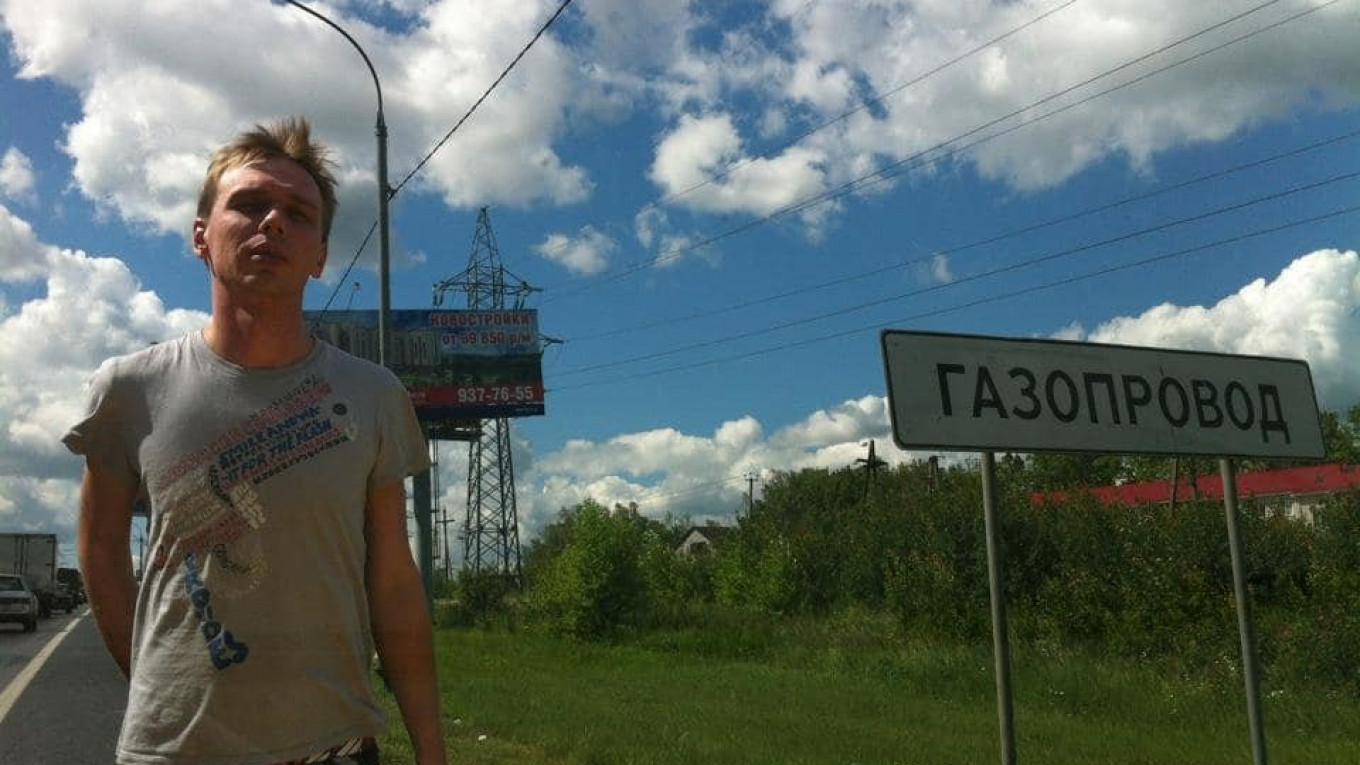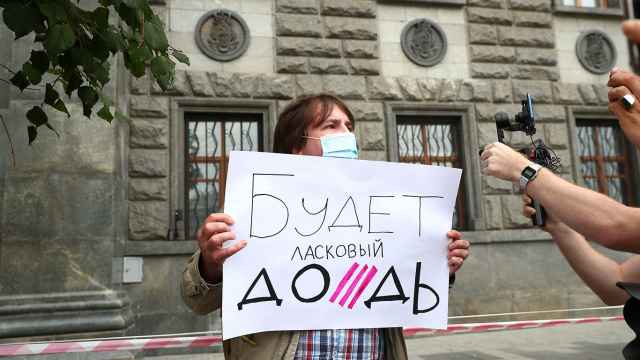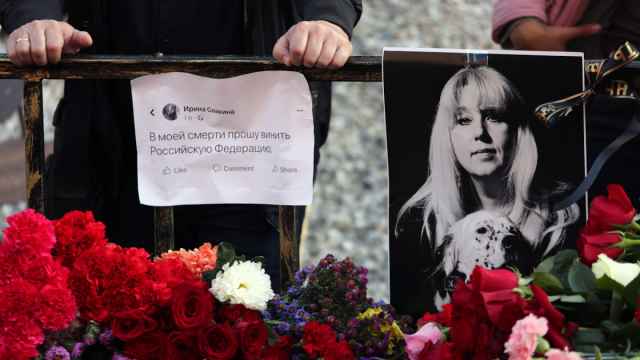Ten years ago this month, Ivan Golunov wrote his first freelance article for Alexei Munipov, an editor at Bolshoi Gorod, or Big City, a since-shuttered magazine. The story was about the arrest of a young artist in the Siberian city of Novosibirsk on what appeared to be fabricated drug charges.
A decade on, Golunov and his defenders say he has suffered the same fate as the artist. After he submitted an article on corruption in the funeral business to his editor at the Meduza news outlet on Thursday afternoon, Moscow police stopped Golunov in the city center and found the club drug mephedrone in his backpack.
“It’s an irony of fate that pretty much the same thing has now happened to Vanya,” said Munipov, using a diminutive of Golunov’s first name. “And to add to the irony, his second article for me a year later was about an odd cremation company.”
Golunov’s arrest has sparked outrage in Russia. Protestors have gathered outside the main police building in Moscow for five days running, demanding his release. The country’s three main business dailies — Kommersant, RBK and Vedomosti — ran matching cover pages on Monday reading: “I am/We are Ivan Golunov.” On Wednesday, several thousand are expected to turn out for a march in his name through central Moscow.
That his arrest has elicited such a strong response speaks both to the person Golunov is and the work he has done in uncovering rampant corruption, even as Russian journalism has faced financial and political pressures, say some of his closest colleagues.
“Much of what’s happening in Moscow today is like tales from the Middle Ages, just behind a modern facade,” said Munipov. “And we only know all of this because of Vanya.”
In the years since he published those two articles, Golunov, 36, has become one of Russia’s foremost investigative journalists, with stops at Vedomosti, Forbes Russia, Slon.ru (now Republic), RBK, the independent television channel Dozhd and Meduza.
Training his eye on the mundane topics most other journalists wouldn’t even think to cover, Golunov has illuminated crime and corruption that is seemingly everywhere and behind everything: ranging from granite sidewalk tiles to New Year’s decorations to the cilantro business.
Those who have worked closely with him say that the instinct to turn over every pebble in search of a story comes from a deep well of curiosity and a keen interest in where he lives — so much so that he didn’t even leave Russia until well into his adult life, telling colleagues that there was always more to explore at home.
“I remember there was this big sale of Aeroflot tickets one year to all these random places around the country and he immediately bought 30,” said Maxim Kashulinsky, Golunov’s editor at Forbes Russia and Slon.ru. “He’s motivated not as much by a sharp sense of justice as an interest in what is happening around him and in the country.”
While his work has uncovered corruption on a national level and abroad, it is Moscow that has provided the setting for some of his most memorable work. He found that a deputy mayor’s relatives earned billions from city contracts, that Moscow officials were linked to dumps in a northern region where the city is intending to transport six million tons of trash and that the son of Russia’s Prosecutor General was syphoning taxpayer money through Moscow’s public toilets.
“Moscow is a richer city than Berlin, Paris or London, while people live here on average worse than in those European capitals, and this is because of corruption,” said Ilya Yashin, a Moscow deputy who rails against corrupt practices at City Hall. “Golunov is one of the few journalists that have been shining a light on how officials steal from citizens. His investigations were always loud, even if he was quiet and humble about his work.”
Those self-effacing qualities were able to win Golunov the respect of Moscow officials, said Elizaveta Osetinskaya, a fellow reporter at Vedomosti in the early aughts and later his editor at RBK, even if they didn’t applaud his articles.
“We were in an interview with a Moscow official once for hours and the official patiently answered every single one of Vanya’s questions,” she said. “These people weren’t thankful for his work, but he knew everybody and they would all answer his questions and treat him professionally.”
The authorities have nonetheless clamped down on independent journalism in recent years, and Golunov had to bounce from outlet to outlet in search of a home where he could continue to produce his work. After a censorship scandal at RBK, he landed at Meduza in 2016. Its main newsroom is based in Latvia to escape potential pressure in Moscow.
“He’s one of 10 to 20 people left in the country who produce fair and professional investigative work,” said Kashulinsky.
That seemed to eventually catch up with him last week when he was arrested for carrying drugs and accused of running a narcotics laboratory out of his apartment. In a court appearance, Golunov said he had received warnings not to work on his latest article. In interviews, colleagues told The Moscow Times that they have never even witnessed Golunov drinking alcohol, let alone taking drugs.
The case has quickly begun to fall apart. Moscow police said that the packets of drugs found on Golunov contain the DNA of multiple people, while an analyst said that no drugs were found in Golunov’s system. The General Prosecutor’s office, in turn, has asked to take over the case, and Kremlin spokesman Dmitry Peskov has said that it “has raised numerous questions.” On Monday, the Proekt investigative outlet reported that Vladimir Putin wants the case settled before his annual televised phone-in on June 20.
If that happens, Golunov will go back to doing what he does best. Which, he explained in a Facebook post last April about how he found a corrupt scheme in the replacement of elevators in Moscow apartment buildings, is paying attention.
“After all, offices that usually go unnoticed are often where the grandest of work is done,” he wrote.
A Message from The Moscow Times:
Dear readers,
We are facing unprecedented challenges. Russia's Prosecutor General's Office has designated The Moscow Times as an "undesirable" organization, criminalizing our work and putting our staff at risk of prosecution. This follows our earlier unjust labeling as a "foreign agent."
These actions are direct attempts to silence independent journalism in Russia. The authorities claim our work "discredits the decisions of the Russian leadership." We see things differently: we strive to provide accurate, unbiased reporting on Russia.
We, the journalists of The Moscow Times, refuse to be silenced. But to continue our work, we need your help.
Your support, no matter how small, makes a world of difference. If you can, please support us monthly starting from just $2. It's quick to set up, and every contribution makes a significant impact.
By supporting The Moscow Times, you're defending open, independent journalism in the face of repression. Thank you for standing with us.
Remind me later.







